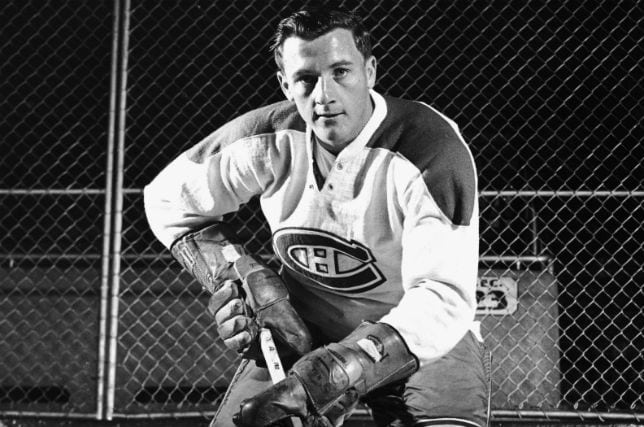
Remembering Dickie Moore, one of the greatest left wingers ever
Dickie Moore spent much of his career overshadowed by other Montreal Canadiens greats, but he was a vital cog in the most dominant dynasty the NHL has ever seen. Moore died Saturday at the age of 84.
 Remembering Dickie Moore, one of the greatest left wingers ever
Remembering Dickie Moore, one of the greatest left wingers everJim Devellano was a 25-year-old Ontario scout for the St. Louis Blues when he first encountered Dickie Moore. It was the spring of 1968 and the Blues had just made a run to the first post-expansion Stanley Cup final with Scotty Bowman behind the bench and the likes of Moore, Doug Harvey, Glenn Hall and Al Arbour.
The Solomon family that owned the Blues also owned a place in Miami called the Golden Strand and, as a reward for such as successful season, rewarded the players and management with a vacation at the hotel. “I’m standing by the pool fully clothed and somebody grabs me by the waist and in I went,” Devellano said. “And it was Dickie Moore.”
That was typical of Moore, who died at the age of 84 on Saturday. The man who didn’t take life terribly seriously off the ice was the polar opposite on it, carving out a Hall of Fame career by being a relentless and proud competitor who had the perfect combination of skill, toughness, work ethic and passion for the game. It made him one of the greatest left wingers ever to play the game and it made him a vital cog on the greatest dynasty the NHL has ever seen. Moore was overshadowed on that great Canadiens team behind the likes of Rocket Richard, Bernie Geoffrion, Jean Beliveau, Harvey and Jacques Plante, but the Canadiens would not have been as successful without them. If there had been a Selke Trophy when Moore played, his trophy mantle would be full of them. As it stands, he had to be content with two Art Ross Trophies as the NHL’s scoring champion, a testament to his ability at both ends of the ice.
Hockey people like to talk these days about players who “play the game the right way." It’s one of those catch phrases that has come into vogue. Well, Dickie Moore played the game the right way long, long before it became fashionable.
Devellano saw it in 1967-68 when a 37-year-old Moore came out of retirement to sign with the Blues. His ravaged knees limited him to only 27 regular season games, but it was in the playoffs that the burning competitor in Moore came out. The Blues needed seven games to beat the Philadelphia Flyers in the first round and seven more to dispatch the Minnesota North Stars in the second round. They would not have done it without Moore who led the Blues in both goals and points in the post-season with 7-7-14 totals.
“By the time we got him, he had two bad knees,” Devellano said, “but he was a major reason why we advanced to the Stanley Cup final.”
Moore retired for good after that playoff, then embarked on a post-season career where he made millions with Dickie Moore Rentals, the company he owned and operated right up to his death. Specializing in renting heavy equipment to construction companies, Moore had offices in both Montreal and Toronto and trailers bearing his name are fixtures on many construction sites in Canada’s two biggest cities.
And as a businessman, Moore displayed the same sense of resilience and passion he did as a player. He started his business renting lawnmowers and small equipment out of a trailer behind a Dairy Queen he owned in suburban Montreal and built it into a multi-million dollar empire. And it was that sense of resilience that helped him carry on when his 17-year-old son Richard Jr., was killed in a car accident in 1973 and aided his recovery from his own car accident in 2006 when he suffered 11 broken ribs and serious injuries to his spine, neck and knees. Moore was also an active member of the Canadiens alumni group, quietly raising money for former players in need. All it usually took was a phone call to Moore to get something done. On one occasion, a former player who played just four seasons with the Canadiens needed a specially equipped van to accommodate his wheel chair. A representative organizing a charity event to raise money to buy the vehicle called Moore to see if the Canadiens alumni could donate some memorabilia to be auctioned off.
“Leave it with me,” Moore said. A few days later, the charity got a call informing it that the new van would be paid in full by the Canadiens alumni.
Moore will be remembered as the kid who rose from hardscrabble origins in working class Montreal to become an all-time great in both hockey and business. When his No. 12 was retired by the Canadiens in 2005, then Canadiens owner George Gillette jokingly sent him a toilet seat, poking fun at how Moore’s company would rent portable toilet facilities to construction companies. Moore let it be known that he did not at all appreciate the gesture.
“Hey, I’m a proud guy,” he said.

